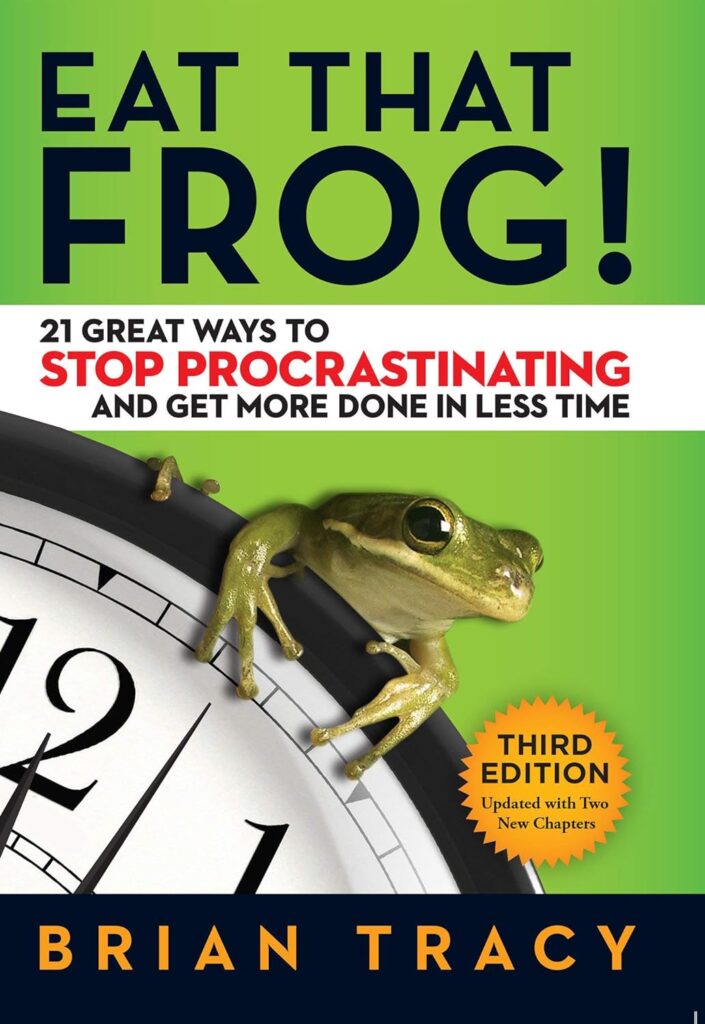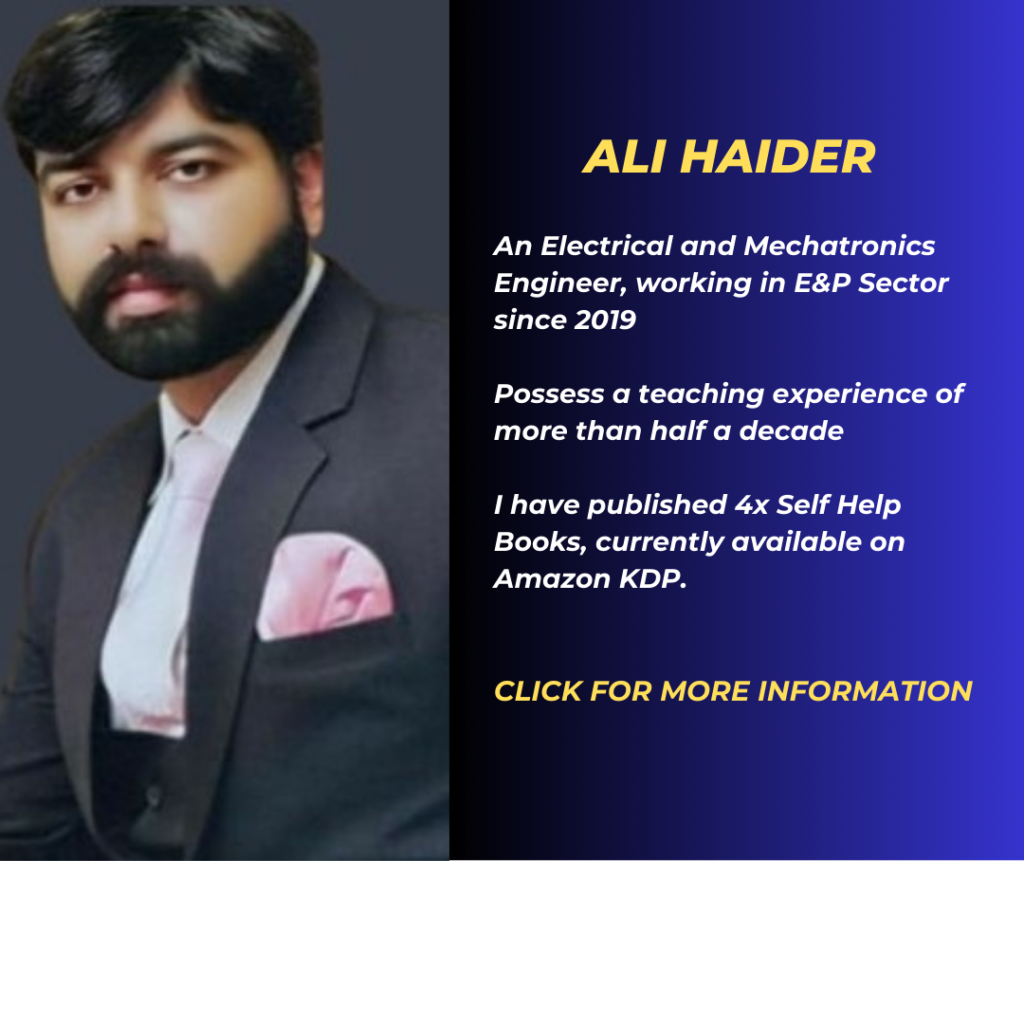
1 Line Summary
Conquer your most challenging task as “first thing every morning” for ultimate productivity and success.
What Will You Learn
By reading “Eat that Frog”, you’ll learn how to:
- Boost productivity,
- Reduce stress and anxiety,
- Prioritize effectively,
- Develop unstoppable momentum,
- Maximize your time,
- Achieve your goals
Best Quotations from the Book
- “You cannot eat every tadpole and frog in the pond, but you can eat the biggest and ugliest one, and that will be enough, at least for the time being.”
- “The hardest part of any important task is getting started on it in the first place. Once you actually begin work on a valuable task, you seem to be naturally motivated to continue.”
- “One of the very worst uses of time is to do something very well that need not to be done at all.”
- “Everyone procrastinates. The difference between high performers and low performers is largely determined by what they choose to procrastinate on.”
- “People who take a long view of their lives and careers always seem to make much better decisions about their time and activities than people who give very little thought to the future.”
- “The most valuable tasks you can do each day are often the hardest and most complex. But the payoff and rewards for completing these tasks efficiently can be tremendous.”
- “It is the quality of time at work that counts and the quantity of time at home that matters.”
- “Refuse to complain about your problems. Keep them to yourself. ”
Book Summary
Set the Table
- Identify your goal. Be clear about what you want to achieve. Write it down; clear, written goals motivate you and fuel your achievement.
- Set a deadline. This creates urgency and helps avoid procrastination.
- Plan, List and Organize all the steps you need to take.
- Start immediately and do something daily towards your goal. Keep moving forward without stopping.
- Remember, success requires a definite purpose and a burning desire to achieve it.
Plan Every Day in Advance
- Plan now; bring your future goals into the present and start working on them.
- Tackle big tasks one step at a time, like eating an elephant bite by bite.
- Use your mind; the ability to think, plan, and decide is your best tool to increase productivity and overcome procrastination. Unplanned actions often lead to failure.
- Follow the 6P formula; Proper Prior Planning Prevents Poor Performance. Systematic time planning can greatly enhance your productivity.
Apply the 80/20 Rule to Everything
- Use time wisely. We always have enough time if used correctly.
- The most valuable task, often the hardest, should be tackled first.
- Top 20% Rule: “Always question if a task is in the top 20% of your activities before starting.”
- Avoid small tasks first; Resist the urge to clear up minor things initially.
- Time management is life management. Choose tasks wisely and focus more on high-value activities.
Consider the Consequences
- Greatness and success come from channeling your energies into one area.
- Your attitude towards time greatly influences your actions and choices.
- Thinking about the future improves your present decisions.
- Always consider the potential outcomes of your actions. Continual reflection on the consequences of your actions helps prioritize.
- The ability to focus on a single task is crucial. There’s always time for important tasks. Identify your high-value activities and start working on them. Never let lesser things distract you from what matters most. Just start, and you’ll find the task gets completed.
Practice Creative Procrastination
- Prioritize Big Tasks. Allocate time for significant tasks daily and plan your workload in advance.
- Delay Small Tasks. It’s a powerful technique that can transform your life.
- Focus on the most challenging tasks before anything else.
- Eliminate Low-Value Activities. Procrastinate, delegate, or eliminate tasks that contribute little to your life.
- Regularly assess your activities, discontinue time-consuming tasks with no loss, and use saved time for quality enhancement activities like family time, reading, or exercising.
Use the ABCDE Method Continually
- Concentration is the key to success, directing all energy towards a single goal without distraction (William Mathews).
- The method’s strength lies in its simplicity: begin with a to-do list for the day.
- Assign each task a letter (A-E) before starting. “A” tasks are crucial, the “frogs” that must be tackled first.
- If multiple “A” tasks exist, prioritize them as A-1, A-2, etc. Your A-1 task is your biggest challenge.
- “B” tasks are less important, the “tadpoles” of your work. Never do a “B” task if an “A” task remains.
- “C” tasks are nice-to-do items with no consequences. “D” tasks can be delegated.
- “E” tasks can be eliminated without any impact. This approach ensures focus and productivity.
Focus on Key Result Areas
- Focusing all physical and mental resources enhances problem-solving ability significantly. You are employed to deliver specific results.
- Compensation is for a certain quality and quantity of work, which when combined with others’ work, creates a valuable product or service.
- The quality of time spent at work is crucial, and the quantity of time spent at home is significant.
- Your work’s value is determined by the market’s willingness to pay for the product or service it contributes to.
- Balancing professional commitments with personal time is key to a fulfilling life.
Prepare Thoroughly Before Your Begin
- Many projects remain incomplete due to lack of initial preparation.
- “Almost done” often means “not yet started”. Avoid this trap.
- Face your fears and take action.
- As Wayne Gretsky said, you miss 100% of the shots you don’t take. So, start working and see it through to completion
Take it One Oil Barrel at a Time
- Individuals with average abilities can achieve great things by focusing persistently on one task at a time (Samuel Smile).
- Progress is made step by step, no matter how small the steps may be. Even the longest journey begins with a single step.
- Large tasks may seem daunting, but when broken down into smaller parts, they become manageable.
- Persistence and gradual progress are the keys to accomplishing any task, regardless of its size or complexity.
Upgrade Your Key Skills
- Success is achieved by providing superior service beyond expectations, regardless of the task (Og Mandino).
- Regularly enhance your skills in your primary areas of work.
- Progress is a constant process; if you’re not improving, you’re regressing (Pat Riley).
- Lifelong learning is a prerequisite for success in any field.
- Don’t let weaknesses hinder you; everything can be learned.
- Strive to be a knowledgeable expert in your field, utilize travel time for learning, and commit to being a lifelong learner.
Leverage Your Special Talents
- Strive for excellence: Go beyond your assigned tasks, adding extra effort makes a big difference.
- The additional work you put in is often the most valuable.
- Treat your earning ability as your most important asset. Your greatest financial resource is your capacity to earn.
- Recognize and address the major obstacles that limit your progress.
Identify Your Key Constraints
- Concentrate fully on your current task, like focused sunlight creates fire.
- Determine your most impactful life and career goals. Understand what’s slowing your progress and why you haven’t achieved your goal yet.
- Start working towards your goal without delay.
- Shift focus from the enormity of the task to a single actionable step. Achieve large tasks by breaking them into smaller steps.
Put the pressure on Yourself
- Success requires relentless focus on a single problem without fatigue.
- Leaders are the rare 2% who can work independently.
- Your actions or inactions shape your self-reputation. Successful individuals self-impose high performance standards.
- Establish deadlines and sub-deadlines to create a forcing system.
- Protecting and nurturing your energy is key to happiness and productivity.
Maximize Your Personal Powers
- Consolidate your resources and abilities for mastering a field. Direct all your energy and skills towards excelling in one area.
- Being well-rested can significantly boost your productivity. Your body, like a machine, uses food and rest to generate energy.
- This energy is then used to achieve important life and work tasks.
Motivate Yourself into Action
- Supreme joy is found in the thrill of victory and creative action.
- Maintain motivation by embracing optimism, a key to success and happiness.
Always respond with “I feel terrific!” when asked about your well-being.
- Avoid sharing problems as most people are indifferent or pleased about them.
- Your thoughts shape your identity, so keep them in check.
- Accept full responsibility for your actions and occurrences in your life.
Get out of the Technological Time Sinks
- Life isn’t about speed, but about depth and meaning (Gandhi).
- Most emails (80%) are unimportant and should be deleted. Only 4% need immediate attention, the rest can be handled later.
- Resist the temptation to constantly check your devices.
- Create quiet zones in your life for peace and tranquility.
- To achieve more, prioritize tasks of higher value and eliminate those of lower value.
Slice and Dice the Task
- Habits start small but grow stronger with repetition, eventually becoming unbreakable (Orison Swett Marden).
- Tackle a big, complex task you’ve been avoiding by breaking it down into manageable parts.
Create Large Chunks of Time
- Focusing your energy on a few goals can greatly enhance your life.
- An effective work habit is to rise early and work from home for a few hours.
- Just as pyramids were built block by block, a successful life and career are built task by task.
Develop a Sense of Urgency
- Don’t wait for the perfect moment, start now with what you have and you’ll find better tools as you progress (Napoleon Hill).
- Productive people think, plan, set priorities, and then swiftly act towards their goals.
- Actions speak louder than words, so focus on doing rather than talking.
- Success often comes with a fast pace, so start and maintain a steady momentum.
Single Handle Every Task
- Every significant human accomplishment has been the result of prolonged, focused effort.
- The key to success is doing what needs to be done, when it should be done, regardless of how you feel (Elbert Hubbard).
- Success hinges on discipline. Self-discipline, self-mastery, and self-control form the foundation of character and high performance.
- The real measure of your character, willpower, and determination is starting a high-priority task and seeing it through to completion. Persistence is the practical application of self-discipline.
Decide to follow these rules every day until they become a normal part of your life. Once these personal management habits become a part of who you are, there will be no limit to what you can achieve in the future.
Stop hopping around and swallow the biggest frog in your pond with Brian Tracy’s “Eat That Frog”! Don’t just read it, “eat that frog” today!
Also read “Solving the Procrastination Puzzle”, “The Compound Effect”, “The Slight Edge”, “The 4 Disciplines of Execution” and “5 Most Effective Time Management Strategies to Enhance Personal Productivity“


Every significant human accomplishment has been the result of prolonged, focused efforts. Great effort has been made for this blog, more power to you.
Pingback: “Breaking The Habit Of Being Yourself”: Book Summary »
Pingback: “The Compound Effect” by Darren Hardy: Book Summary
Pingback: “Failing Forward” by John Maxwell: Book Summary »
Pingback: “The 360-Degree Leader” by John Maxwell: Book Summary »
Pingback: 14 Essential Traits of a Great Leader and How to Develop Them »
Pingback: “How to Lead Smart People” : Book Summary »